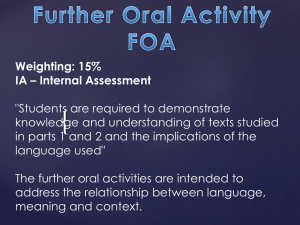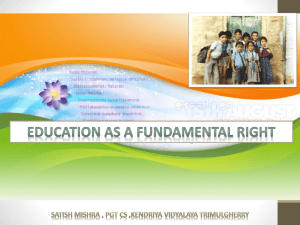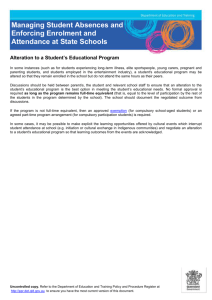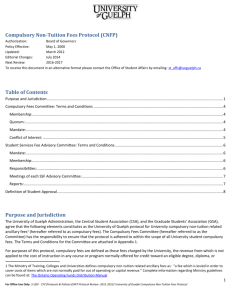Central Student Association Appendix H – Compulsory Non
advertisement
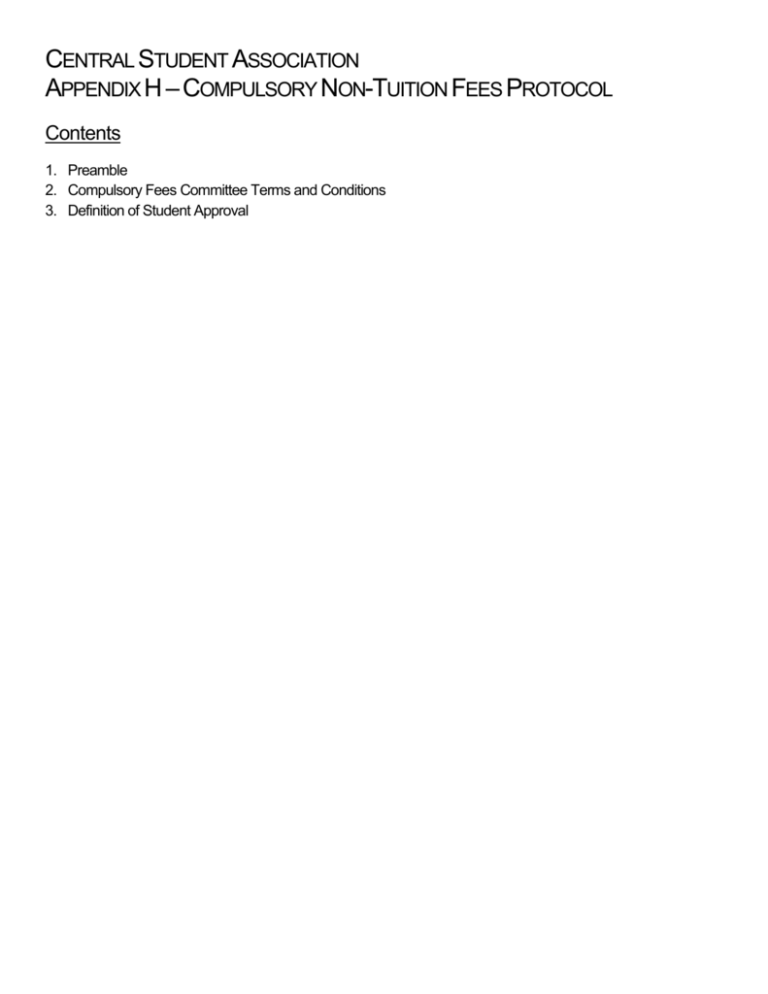
CENTRAL STUDENT ASSOCIATION APPENDIX H – COMPULSORY NON-TUITION FEES PROTOCOL Contents 1. Preamble 2. Compulsory Fees Committee Terms and Conditions 3. Definition of Student Approval CENTRAL STUDENT ASSOCIATION APPENDIX H – COMPULSORY NON-TUITION FEES PROTOCOL 1. Preamble The University of Guelph Administration, Central Student Association (CSA), and Graduate Students' Association (GSA), agree that the following elements will constitutes as the University of Guelph protocol for University compulsory non-tuition related ancillary fees (hereafter referred to as compulsory fees). The Compulsory Fees Committee (hereafter referred to as the Committee) has the responsibility to ensure that the protocol is adhered to within the scope of all University student compulsory fees. The Terms and Conditions for the Committee are attached in Appendix 1. 1.1. For the purposes of this protocol, compulsory fees are defined as "those fees charged by the University, the revenue from which is not applied to the cost of instruction in any course or program normally offered for credit toward an eligible degree, diploma, or certificate, but is applied to the cost of services which enhance the cultural/social/recreational environment of students or provide other non-academic services to students." 1.2. Ancillary fees are approved and collected in support of particular programs. There may be specific understandings on a) the intended proportion of expense to be funded by ancillary fees for particular programs and b) the nature of student involvement in policy formulation, resource allocation and service assessment for each program that receives fee support. Information adequate to permit this determination will be made available by the University administration to student governments and interested parties. The Student Services Fees Committee is responsible for this determination which may include the requirement of appropriate annual reports from units or from other advisory bodies related to specific units or programs. 1.3. SSF Advisory Committees are struck annually to provide recommendations to the Committee on resource allocation and service assessment for each program that receives financial support from the Student Services Fee (SSF). The Terms and Conditions for these SSF Advisory Committees are in Appendix 2. 1.4. No new compulsory fees will be recommended to the Board of Governors unless approved by students (Appendix 3). The committee will be responsible for recommending such fees to the Board of Governors. 1.5. Annual increases in existing compulsory fees will be limited to the Statistics Canada consumer price index annual average for Ontario, and in exceptional circumstances, up to a further 3% at the discretion of the Committee. A fee larger than this must first be approved as per the Student Approval process before recommendation to the Board of Governors as outlined in Appendix 3. Students will be informed if the Committee approves a fee increase greater than the cost of living. 1.6. The University reserves the right to decrease operating budget support for any program based on changes in institution revenue or priorities. Whenever there is the possibility of a significant change in University funding for a program or function supported by compulsory fees, discussions will be held in advance with the Committee and the relevant SSF Advisory Committee. In the event of a significant decrease in University funding of a compulsory fee supported program, discussion and consultation may produce agreement on a reduction in the fee level or an appropriate reallocation of the fee revenue. 1.7. Non-compulsory ancillary fees and user fees may be implemented or continue to be charged by the administration. Any new user fee or increase beyond the consumer price index for existing user fees must be approved by the Committee for those programs or functions already supported by compulsory fees. University administration will provide data on such fees to the Committee upon request. This protocol will be reviewed by the Board of Governors at least every five years. Revisions to the protocol that are supported by the signing parties will be considered by the Board on the basis of recommendations from the Student Services Fee Committee. This protocol will be reviewed by the Board of Governors at least once every five years. Revisions to the protocol that are supported by all the signing parties will be considered by the Board of Governors on the basis of recommendations from the Committee. Signed on April 25, 2012 CENTRAL STUDENT ASSOCIATION APPENDIX H – COMPULSORY NON-TUITION FEES PROTOCOL 2. Compulsory Fees Committee Terms and Conditions 2.1. Membership 6 Students: 2 GSA Nominees 2 CSA Nominees 1 Student Senator 1 Student Member of the Board of Governors 5 Faculty or Staff: Appointed by the Associate Vice-President: (Student Affairs) Associate Vice-President: (Student Affairs) or Designate: Convener (non-voting and does not count towards quorum Alternates: May be named by members to ensure quorum; however, alternates will not have voting privileges. The Committee may invite resource personnel to join its meetings for the purpose of providing information on the usage and associated costs of services supported by student services fees. At it’s first meeting in the fall, the Committee will elect the chair, who will have voting privileges. 2.2. Quorum Quorum shall be six members, including a minimum of two students and two faculty or staff. 2.3. Mandate 2.3.1. Review membership and mandate of SSF Advisory Committees (see Appendix 2) on an annual basis 2.3.2. Provide advice to the University Administration regarding student services and associated policies, utilization, costs, funding, delivery arrangements, performance and accountability. 2.3.3. Provide an annual review to ensure compliance to the original terms of the SSF level as mandated; that is no more than 50% of the cost of the programs and services provided by the fee. 2.3.4. Drawing from the reports of the SSF Advisory Committees and other information sources made available to the Committee, review the usage, effectiveness, and associated costs of student services supported by student services fees and forward recommendations to the university administration, as appropriate. 2.3.5. Propose to university administration any revisions in the allocation of student services fees to student services and programs receiving support form such fees, having consideration for user fees in effect. 2.3.6. Propose changes in the level of established compulsory fees to the Board of Governors. Ensure that any proposal for new compulsory fees, whether originated by university administration or the Committee itself, goes through the appropriate advisory and approval process. 2.3.7. Recommend any new University compulsory fees approved by students (see Appendix 3) to the Board of Governors. 2.3.8. Review all referendum questions for proposed new University compulsory fees or for proposed changes in fee levels (i.e. those which necessitate referendum endorsement) to ensure that the referendum question is clear and without bias and is targeted to the appropriate voting group (e.g., CSA membership, GSA membership or both). (See Appendix 3). 2.3.9. Inform University students annually regarding the programs and services receiving support from compulsory fees. CENTRAL STUDENT ASSOCIATION APPENDIX H – COMPULSORY NON-TUITION FEES PROTOCOL 2.3.10. Review Student Life Enhancement Fund (SLEF) applications and final reports annually. The Committee is responsible for allocating funds as outlined in the terms and conditions of the SLEF. 2.4. Conflict of Interest 2.4.1. The Committee is committed to maintaining a high standard of professional integrity and transparency in the collection and distribution of funds generated by compulsory fees. 2.4.2. It is essential that both the Committee members and the University of Guelph community are confident in the Committee. Thus, even the appearance of a conflict of interest should be avoided. As such, members will disclose any potential conflict as outlined below: 2.4.2.1. Committee member(s) will declare a conflict of interest if they or the group they represent are connected to any proposal discussed, or on any proposition to increase fees for the Unit they represent 2.4.2.2. Committee member(s) with a declared conflict of interest will leave the meeting room during the discussion and vote on the proposal. CENTRAL STUDENT ASSOCIATION APPENDIX H – COMPULSORY NON-TUITION FEES PROTOCOL 3. Definition of Student Approval This approval procedure is for referendum process that is required to increase or introduce a University compulsory non-tuition related fee (compulsory fee). New or changes to compulsory fees that are being introduced by student groups must go through the appropriate student government fee process. 3.1. Any request for a new or increased University ancillary fee must be submitted to the Compulsory Fees Committee, who will determine the target group for the question (i.e., graduate students, undergraduate students, or both). 3.2. The request must be accompanied by a petition with at least 1,000 signatures of students who support the question going to referendum. 3.3. The question will be sent to the Executives of the respective student governments for comments on the question. 3.4. The Compulsory Fees Committee will devise the referendum question and the preamble to the question, taking into consideration the original request, as well as the comments from the student governments. The question will include the following information: the fee level and how often it will be collected; if the fee will or will not increase by the cost of living; whether there will be a different fee for part-time students, if the fee can be opted out of, and whether there will be an end point for the fee. 3.5. A student referendum will be administered separately for graduate students and undergraduate students and will normally run at the same time as their General Elections. 3.6. Both the Central Student Association (CSA) and the Graduate Students’ Association (GSA) will present identical referendum questions to their respective constituents, although the dollar about asked of each group may be different reflecting different usages or payment schedules. 3.7. Ballots for graduate and undergraduate students are combined for the purposes of counting; however, quorum for each student group must be reached independently in accordance to the CSA and GSA quorum by-laws. The sum of the number of graduate students who voted and the number of undergraduate students who voted will determine the voting population for those questions where the funding to support programs, services, or facilities cannot be directed specifically to a particular group. 3.8. Provided that quorum is satisfied at both the undergraduate and graduate level, student approval will require a majority (50%+1) of the total valid votes cast. 3.9. The Compulsory Fees Committee will strike an Election Committee with the membership consisting of 3 members of the Compulsory Fees Committee: one undergraduate student; one graduate student; and one faculty or staff member, where the unit or program does not directly benefit from a successful referendum result. The duty of this Committee will be to oversee the referendum process. Voting will normally be held in conjunction with the scheduled CSA and GSA or referendum elections. 3.10. Results of the voting will not be made public until CSA and GSA referendums are complete. The report of the voting will identify the count separately at the undergraduate and graduate student levels. Recommended new fees and/or fee increases must be approved by the Board of Governors.

